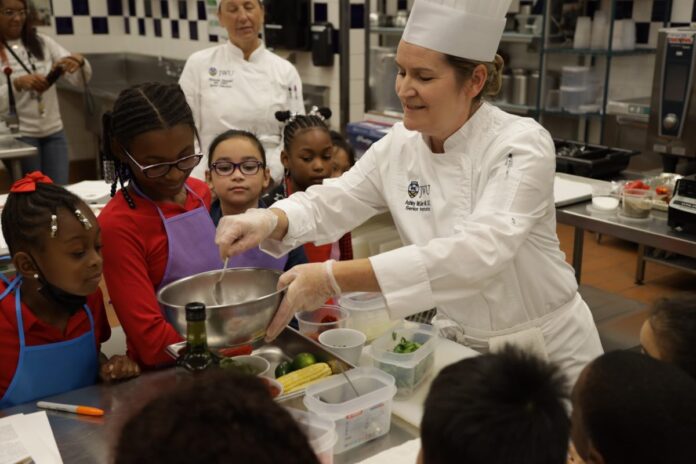- Student gardeners inspire recipes for holiday publication
- Program demonstrates how environmental learning can build vibrant communities
- DOWNLOAD A FREE DIGITAL COPY HERE
Originally conceived as a creative way to encourage customers to use their kitchen appliances, the Duke Energy Recipe Book has grown to become a favorite staple for many of the company’s 8.2 million customers.
Distributed annually in time for the holidays, each edition features a different theme. Over the last two years, the recipe book has featured local restaurants and community organizations across the company’s territories celebrating unique efforts to tackle the impacts of the pandemic.
This year’s offering, “The Grassroots Garden,” began distribution on Dec. 11 via newsletters to Duke Energy’s customers and was inspired by students at Paw Creek Elementary in Charlotte, N.C., and curated by chefs at Johnson & Wales University’s Charlotte campus.
This collaboration resulted in a rich story about sustainability and the environment, while supporting Duke Energy’s goal of building vibrant communities.
 The Duke Energy Foundation sponsored the design and installation of an Outdoor Learning Lab with Out Teach, a Duke Energy partner and a national nonprofit built to inspire and prepare today’s elementary students to become the next generation of fearless innovators.
The Duke Energy Foundation sponsored the design and installation of an Outdoor Learning Lab with Out Teach, a Duke Energy partner and a national nonprofit built to inspire and prepare today’s elementary students to become the next generation of fearless innovators.
“As a native North Carolinian, some of my fondest memories come from shopping at the Carrboro Farmers Market to create our family meals,” said Katherine Neebe, Duke Energy’s chief sustainability and philanthropy officer. “I also learned the importance of access to fresh food. When people have access to local, seasonal ingredients it not only provides nourishment for their body but also supports local farmers and their families as well as advances the sustainability ecosystem. In short, it helps strengthen communities.”
The program included planting, maintaining and harvesting fruits and vegetables in the outdoor learning lab at Paw Creek. Each phase provided an opportunity to see how the students engaged with their outdoor environments and applied topics like reading, science and math to real-life, relevant experiences.
“This was a great opportunity for our students to incorporate environmental learning into their curriculum. It allowed our students to learn about the value of sustainability and therefore we were grateful for this collaboration,” said Paw Creek Principal Danielle Belton.
The final phase of the project culminated with students visiting kitchens at Johnson & Wales University, where two lead chefs taught them lessons about sustainable food practices and exposed them to professional culinary skills and careers.
To engage the students even further, the chefs and students used ingredients grown in the gardens to “test out” several recipes featured in this year’s book. They were also able to get a sneak peek of the set and production of the recipe book, which included film, food styling and professional photography.
“Imparting knowledge to young people by involving them in a project like this is an excellent way to grow both awareness of sustainability and a lifetime desire to be healthy for years to come,” said Chef Ashley McGee, one of the two Johnson & Wales University instructors who worked with students. “It was impressive to see students, at such a young age, have an appreciation for growing their own vegetables and an interest in learning how to use fresh produce to make nutritious meals.”
This year’s digital book includes 24 recipes ranging from main entrees like Secret Ingredient Chili to sweets like Buttermilk Biscuits with Balsamic Fig Jam. For those interested in testing them in their home kitchens, visit the full list at duke-energy.com/2022Recipes.






